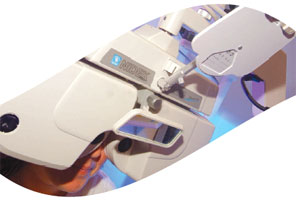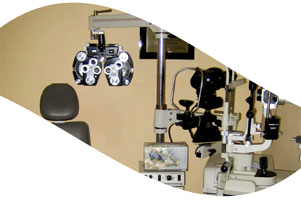| When
do you need the services of an Optometrist?
1. Primary Eye examination
Your Optometrist will perform a battery of tests for
your external and internal eye examination, assess vision
and ability to focus on and discern objects, as well
as other tests to diagnose before advising you the suitable
remedial measures. All people should have periodic and
thorough eye examinations as part of routine primary
care, especially since many eye diseases are silent
or asymptomatic.
2. Vision Correction
The presence of refractive error- myopia, hypermetropia,
astigmatism or presbyopia is to be treated with suitable
non surgical or surgical procedure. Spectacle and contact
lenses are the non surgical modalities and LASIK, PRK,
Clear lens extraction, Lens implants are the surgical
procedure. Your Optometrist is the professional consultant
as to advise you the suitable mode of correction for
you.
 3.
Contact Lens Fitting 3.
Contact Lens Fitting
Contact lenses are the smallest and least visible plastic
discs that are worn on the cornea to correct your refractive
error. Correct design and fitting of the lenses are
essential for comfort, safety, and accurate correction.
A long list of contact lens varieties is available to
suit your specific purpose and your optometrist specially
trained in fitting contact lenses is the professional
consultant to advise and fit a suitable contact lens
for you.
4. Double Vision
If you are experiencing double vision, you should be
evaluated by an optometrist, ophthalmologist, neurologist
or other medical professional immediately. Double vision
may be treated with surgery, medications, vision training
or therapy. A prism, a special lens that bends light
rays, can also be included in an eyeglass prescription.
5. Low Vision Aids
When conventional spectacles and contact lenses do not
work and surgery or medical treatment is not considered
appropriate, then it is time to consider low vision
aids. You need to visit an Optometrist who is specially
trained in low vision practice to help you utilize your
residual vision to become functionally independent.
6. Computer Vision
Syndrome
If you are working on computers for more than two hours
at a stretch and experience eyestrain, headaches, blurred
vision, visual fatigue, dry eyes, foreign body sensation,
visual stress and reduced efficiency at work, you may
be suffering from one or more Computer vision syndrome.
Optometrists have found out that most of these symptoms
can be relieved through a combination of correcting
workstation, posture, specially designed lenses and
in some cases through improving visual skills with vision
therapy.
7. Squint Eyes
Squint eyes –also known as crossed eye or wall
eyes is the condition when the eyes are not in alignment.
One eye may turn in or out, up or down, or may wander
in several directions. Many a times only the symptoms
of strabismus are present. It may appear sometimes and
the rest of the time the eyes may be straight, appearing
only when the eyes are tired. Treatment for crossed-eyes
include eye glasses, prisms, vision therapy and surgery.
The complexity of condition can be dealt successfully
upon co-ordinated efforts of Optometrists and Ophthalmologists.
8. Amblyopia
Ambyopia , also known as lazy eye as one eye or both
eyes stops functioning properly. The condition is not
due to any pathology in the eye but because of poor
eye- brain connection. The brain, for some reason, does
not fully acknowledge the images seen by the amblyopic
eye. Every amblyopic patient , whether he is a child
or an adult, deserves an attempt at treatment by specially
trained Optometrists.
9. Attention Deficit
Hyperactivity Disorder
Attention Deficit Hyperactivity Disorder has been diagnosed
in both children as well as in adults. Individual suffering
from AD(H)D should have complete eye evaluation by a
Behavioral Optometrist. Vision is more than seeing clearly
on the test chart and is the combination of learned
skills, including tracking, fixation ability, focus
change, binocular fusion and others. When all these
skills are developed, the person can sustain attention,
read and write without careless errors, which give meaning
to what they hear and see. An optometrist trained in
vision therapy can work to improve many of such skills.
 10.
Repeatedly same mistake in your chosen sporting activity 10.
Repeatedly same mistake in your chosen sporting activity
You are a very good player. Your coach is the best.
You have worlds best of sporting kit and best of other
sporting facilities. But when you compete at international
level, you lose marginally by fraction of seconds or
scores. And when you analyze the reason for the same
you find that you made similar mistake which you have
been making during your practice session. During your
practice you did not give importance to it. Today if
you want to compete at the international level, you
can not compromise with slightest of error. We work
on all aspects to improve our skill, stamina and endurance,
but we seldom give due importance to vision. Remember
more than 90% information which we get is through our
vision and vision is not just seeing clearly on the
test chart. A slightest of delay in getting information
may delay your response and can ruin your entire career
in your chosen sport. In fact difference between good
player and great player is vision. Your Sportvision
Optometrist is the qualified professional to help you
remove this barrier.
11. Optometrists
and Dyslexia
Dyslexia means poor word recognition. Although vision
is involved, it is mainly a language processing problem.
Eye fixation is the link between the physical environment
and the visual observation. Both of which may be dynamic.
That is why dynamic fixation serves the task of prescribing
a reference point in the world. Dynamic fixation is
the function of extra ocular muscles. A slow time on
dynamic fixation, therefore, may indicate a pre-disposition
to dyslexia. A behavior optometrist may be consulted
to rule out the visual related problems before a diagnosis
of dyslexia is made.
12. Children Eye
Examination
Optometrists are schooled in the developmental (behavioral,
functional or environmental) aspects of vision. Optometrists
are more apt to use lenses, prisms and Vision Therapy
to enhance and improve visual function. These interventions
often improve children's academic and other abilities.
Specially trained in pediatric optometry, a pediatric
optometrist checks the child’s eyes in a holistic
manner because vision is the global process. Seeing
clearly on chart is only one part, which is also ineffective
to assess a child’s vision. Special charts and
tools are needed for the purpose and the pediatric optometrist
is specially trained in the use and application of the
same.
13. Optometrists
and Vision Therapy
The popular saying – glasses solve only a part
of the problem. If provided with vision therapy, the
problem related to vision and visual system will be
no more. Vision therapy is vision training procedure
for the eyes and brain and is a highly effective non-surgical
treatment for most of the common visual problems such
as lazy eye, squint eyes, double vision, convergence
insufficiency, accommodative insufficiency and some
reading and learning disabilities. An optometrist trained
in vision therapy can treat most of the above problems
to enable an individual to treat his symptoms.
|